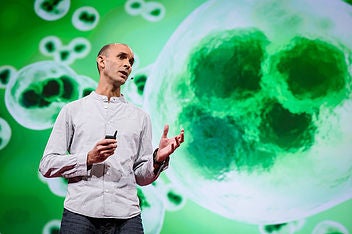KINGSTON, R.I.- November 27, 2017- Anil Seth, professor of cognitive and computational neuroscience at the University of Sussex in the United Kingdom, will present “The Nature of Human Consciousness” as the 10th and final lecture of the University of Rhode Island’s 54th Honors Colloquium. The talk will take place Tuesday, Dec. 5 at 7 p.m. in Edwards Hall, 64 Upper College Road.
Seth is the founding co-director of the Sackler Centre for Consciousness Science and the editor-in-chief of Neuroscience of Consciousness, an open access Oxford University Press journal that publishes papers on the biological basis of consciousness with an emphasis on empirical neuroscience studies in healthy populations and clinical settings. Seth has given many prestigious public lectures on consciousness, including a Royal Institution Friday Discourse (2016) and a main-stage TED talk (2017).
One of the most perplexing problems in neuroscience and philosophy is how we understand consciousness. While the subject is challenging, the desire to answer these questions has become urgent given their impact on mental health. Seth believes that a better grasp of the mechanisms of consciousness will help us understand distorted experiences in psychiatry. “I aim to discover how our experience of the world around us, and ourselves within, can arise from specific kinds of neural interactions in the brain,” said Seth. “Some people think solving consciousness remains beyond the reach of science, but we already know quite a lot and are learning more and more each day.”
Seth’s research is focused on three separate areas, the first being understanding the difference between different conscious ‘levels’ such as normal wakefulness and dreamless sleep. “We study what happens in the brain that underlies these large changes in conscious states, and we try to come up with quantitative measures of the level of consciousness,” said Seth. “We are able to do this thanks to many collaborations with neurologists and anesthesiologists who can provide exciting data.”
The second aspect of Seth’s research involves conscious “content,” including visual and auditory consciousness. “Conscious contents describe what we are aware of, when we are aware,” Seth explained. “Here, we want to understand the mechanisms that give rise to conscious, rather than unconscious perception, and our research is telling us that it has everything to do with how the brain makes predictions about sensory signals.”
The third aspect is the one Seth perceives as the most important, and involves how we experience ourselves as unified persons. “Our experience of being a self is a kind of neural prediction or construction which, while we normally experience it as being unified and stable, can come apart in all sorts of ways in the lab and in the clinic,” Seth said. “There are surprising commonalities between how we perceive and experience the world, and how we perceive and experience being a ‘self’ within it.”
The goals of Seth’s research include an increased understanding of the brain basis of consciousness, and to use this understanding to drive new approaches to diagnosis and treatment of people with mental illnesses and psychiatric disorders.
“These goals interact closely because we can study people with psychiatric conditions to better understand consciousness and then use our understanding of the biology of consciousness to better understand what happens in these psychiatric conditions,” explained Seth. “It is important that people understand that science is not something that takes away the magic and mystery of what being a person is; rather it enriches it. The more we see ourselves as continuous with nature, as part of it, the more wonderful things become.”
Titled, “Origins: Life, the Universe and Everything,” this fall’s colloquium addresses such questions as “Where did we come from? How did the universe begin? How did intelligent, rational beings arise? And from such humble beginnings, how did we develop a mind that can ask these big questions? Now in its 54th year, the colloquium is the University’s premier public lecture series, offering lectures on most Tuesday evenings through Dec. 5. Seth’s lecture will be shown on the web at stream.uri.edu
Sponsors: Honors Program • URI Office of the President • URI Office of the Provost • 125th Anniversary Steering Committee • URI Foundation • The Mark and Donna Ross Honors Colloquium Humanities Endowment • The Thomas Silvia and Shannon Chandley Honors Colloquium Endowment • URI College of Arts & Sciences • URI College of Pharmacy • URI John Hazen White Sr. Center for Ethics and Public Service • URI Gender and Women’s Studies Program • URI Office of Community, Equity and Diversity • URI College of Engineering • URI College of the Environment and Life Sciences • URI College of Health Sciences • URI College of Business Administration • URI College of Nursing • URI Division of Student Affairs • URI Department of Communications and Marketing • URI Department of Publications and Creative Services • URI ITS Instructional Technology and Media Services • URI Feinstein College of Education and Professional Studies • George and Anne Ryan Institute for Neuroscience.
Olivia Ross, an intern in the Marketing and Communications Department at URI and public relations major, wrote this press release.

